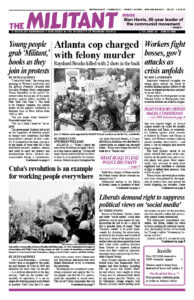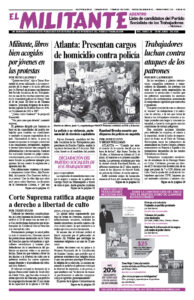July 3, 1995
Hundreds of thousands of workers joined marches across South Africa June 19 to demand passage of legislation, which will wipe out apartheid-era labor law, culminating a two-week mass action campaign.
Apartheid labor law codified the superexploitation of African labor, drastically limiting workers’ rights. Through expanding working-class struggle in the past two decades, workers have carved out new space to organize politically.
The working class is seeking to put its stamp on the new constitution — and the new labor law. Progress in doing so will mark a step forward in the formation of a South African nation and the forging of a working class, unburdened with the divisions and restrictions imposed under white rule — including the eradication of giant disparities in wages and living conditions between blacks and whites.
July 3, 1970
AUSTIN — A U.S. district court in Dallas ruled June 17 that the Texas abortion laws are unconstitutional because “the fundamental right of single women and married persons to choose whether to have children is protected by the Ninth Amendment through the Fourteenth Amendment.”
While abortion laws in other states have been declared unconstitutional for various causes, the Texas ruling is the first to assert that women have a basic right to control their own childbearing functions.
Women’s liberation activists across the state had supported the case, through petitioning and picketing at the Dallas courthouse. Austin Women’s Liberation members’ plans include a statewide conference, demonstrations, picketing and more petitioning. As one Texas woman said, “The court case was a start; it certainly isn’t enough.”
June 30, 1945
Big business on June 20 introduced into the United States Senate a legislative “master plan” to paralyze and destroy the American labor movement in the post-war period.
Termed an “Industrial Peace” bill, the measure is actually a virtual declaration of war against the most cherished and hard won rights of labor — free, unregimented unions, union security through the closed shop and, above all, the right to strike.
Not in many years has there been such immediate, vigorous and unanimous denunciation of a proposed federal statute as the blast unloosed against the bill by every single sector and prominent leader of the American union movement.
No greater blow could have been dealt to the phony capital-labor “peace charter,” which the union officials have been trying to peddle to the workers, than the introduction of this vicious bill.

